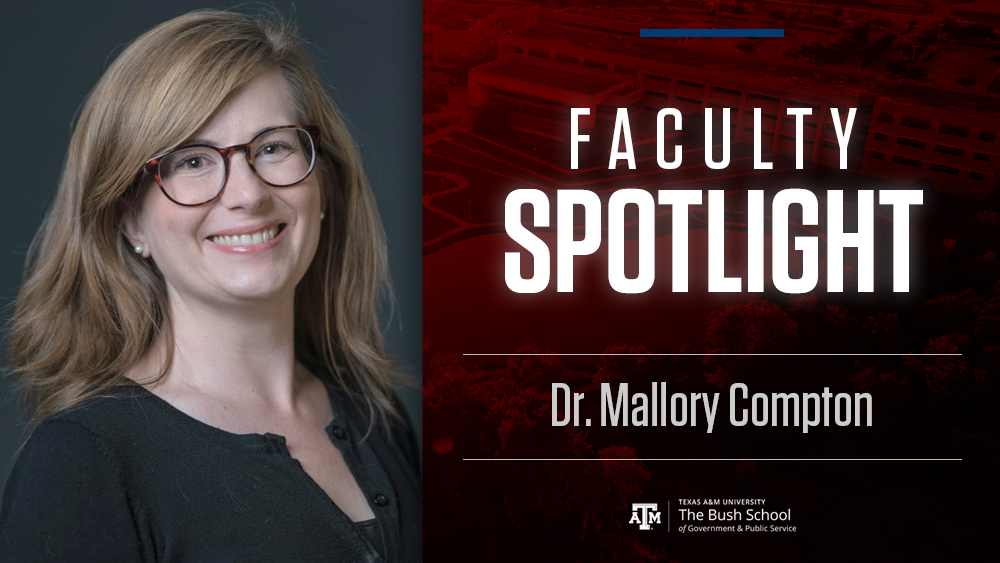
Mallory Compton is in her third year teaching in the Department of Public Service and Administration and earned both her bachelor’s and doctoral degrees at Texas A&M University. She currently teaches foundations of public service, public management, and social welfare and health policy.
What research project are you currently working on?
There are two that are worth mentioning. First, I’m working with a coauthor at the University of Colorado, Boulder, to better understand why individuals support unemployment insurance policies and what goes into shaping those preferences for unemployment insurance. I’m really excited about it because we can answer questions like these: Does greater labor market risk or greater labor market insecurity motivate more support for these kinds of policies? Does it change the preferred design of these policies?
A second project is related. I’m working with a group of coauthors, including Professor Greer here at the Bush School, to better understand what shapes performance in the administration of unemployment insurance. We’re using detailed data on administrative errors to answer questions about the contexts and cases in which state agencies make decisions with more or fewer errors.
What are you hoping to learn through your research and how could it benefit society?
My current research on unemployment insurance administration and individuals’ preferences for unemployment insurance policy can tell us more about policy responsiveness and government performance. It’s important to know what contributes to the performance of public organizations in administering these programs, with the aim of improving processes for better outcomes. It’s also important to understand when and why citizens support those programs so we can evaluate whether their governments are providing services that people actually value.
In a paper that’s currently under review [for the second project on administrative error], we find that clientele of color are more likely to experience an administrative error that’s not their own fault but is the fault of the public organization. These clients are more likely to be wrongfully denied access to program benefits or wrongfully underpaid. Technology reduces disparities in performance across individuals and groups, but it doesn’t totally eliminate them.
I hope my research can contribute to a better understanding of both quality of performance and equity of performance in public organizations and in unemployment insurance.
What do you like most about working at the Bush School?
The people. I am consistently impressed by the quality of students’ work, their insight, and their willingness to do hard work. It makes teaching a joy. It makes it a lot easier when students are engaged, present, respectful, and professional. Also I mentioned that I’m working with Professor Greer, so there’s a community of scholars here that work on similar questions. I feel very supported and engaged theoretically and research-wise.
Have you ever worked outside of academia? If so, what did you do and how does that inform your teaching or research?
I have not worked outside of academia full time. I’m a political scientist by training, so my work tends to cross-cut both political science and public administration. I’m really motivated by questions that deal with success in governance, performance in public service, and equity in public service. I’m intrigued by policies that are aimed at ensuring individuals’ economic security. I want to understand the political prerequisites of success in public policies and governance.
An experience that I found really formative was in my MPA program at the London School of Economics. We had a capstone project at the Department of Energy and Climate, and I really enjoyed the opportunity to work with my cohort on a project that meant something. It happened to be a more research-oriented project, and that was one of the dominoes that led to my wanting to contribute to research.
What research or teaching accomplishment are you most proud of and why?
Last year the MPSA class of 2021 voted to award me the Silver Star faculty teaching award. I did not expect that. Teaching and working with students is important to me, and it meant a lot that students also appreciated being in my classroom. It meant a lot that it was a student award and that was their voice.
What is your favorite class to teach and why?
I like teaching foundations of public service because we talk about some of the biggest issues, problems, and tensions in public administration in the US. Students inevitably have really insightful and thoughtful things to say about these big, important questions. I enjoy talking about these things, and foundations of public service is a great context to do so in.
